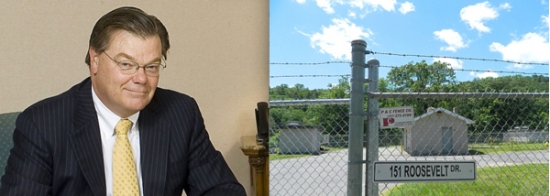 A five-year legal battle between the Town of Seymour and the Regional Water Authority over a shed off Route 34 is over.
A five-year legal battle between the Town of Seymour and the Regional Water Authority over a shed off Route 34 is over.
Birmingham Utilities, which is technically a subsidiary of the water authority, owns an 8‑acre well field at the corner of Route 34 and Jefferson Street.
Back in 2010, the company built a 10-by-14-foot brick shed on the property with an electrical switch inside to power a generator.
The town assessed the equipment inside the shed at $237,500 and sent the company a $5,740 tax bill.
Hold on, the company said — you’re not allowed to do that.
The company pointed to the 1977 state law which created the water authority, part of which says towns can’t tax the authority or its subsidiary corporations.
The water authority paid the tax bill under protest and appealed to Seymour’s Board of Assessment Appeals. The assessment appeals board unanimously denied the water authority.
So the company appealed to Superior Court.
The case wound its way through the court system until New Britain Superior Court Judge Carl Schuman handed down a ruling April 28 siding with the town.
The decision is posted at the bottom of this story.
Richard J. Buturla, a partner in the Milford-based law firm Berchem, Moses, & Devlin, represented Seymour in the case.
The judge’s ruling is a bit technical. It says the company that owns the property is a subsidiary of a water authority subsidiary.
That means it doesn’t qualify for the tax exemption.
The tax exemption would only apply if the company were directly owned by the water authority, the judge wrote, agreeing with an argument made by Buturla.
That might seem like splitting hairs, but the judge cited a 2001 state Supreme Court decision saying that when there’s any confusion in state laws regarding taxes, judges have to “resolve any ambiguity in the statutory formulation of an exemption against the taxpayer.”
Judge Schuman noted in the ruling that the water authority could get an exemption from the Seymour taxes if it changes its subsidiaries’ corporate structure, or transfers ownership of the property.
Asked if they have any plans to do that — or appeal the judge’s decision — a spokeswoman for the water authority said probably not.
“While we were disappointed in the decision that took an overly technical view of the special legislation establishing the Regional Water Authority, the decision has very limited applicability and represented minimal tax dollars, most of which the RWA continued to pay while the case was pending,” Kate Powell, the spokeswoman, said in an email.
The Valley Indy emailed Seymour First Selectman Kurt Miller Thursday asking how much the down’s legal bills in the case were.
Miller replied that he didn’t know the exact figure, but that it “wasn’t that much. Well justified on our end.”